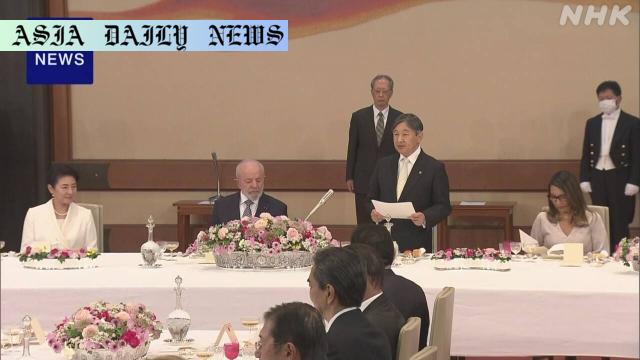Imperial Banquet: Japan’s Emperor and Empress host first state banquet in six years, welcoming Brazil’s President Lula and his wife.
- The Emperor and Empress of Japan hosted the first state banquet in six years to welcome Brazil’s President Lula and his wife.
- Princess Aiko attended her first state banquet alongside other Imperial family members.
- The banquet, traditionally French, featured Japanese cuisine appetizers, reflecting cultural diplomacy.
- The Emperor emphasized environmental cooperation and ties with the Nikkei Brazilian community.

Reviving Diplomatic Traditions After Six Years
Japan’s Emperor Naruhito and Empress Masako brought a historic moment to life by hosting their first state banquet in six years. The distinguished event, held at the Imperial Palace, honored Brazilian President Luiz Inacio Lula da Silva and his wife, who visited Japan as esteemed state guests. The banquet marked another milestone in Japanese diplomacy, highlighting the Emperor’s commitment to fostering international relationships and cultural exchange. Since the last banquet in 2019, this event has gained symbolic significance, as it connects two nations committed to closer ties and collaborative endeavors.
The Emperor’s address referenced his deeply personal connection to Brazil, recounting his official visit there and the warm welcome by Japanese immigrants and their descendants. His remarks were not only nostalgic but forward-looking, as he highlighted shared global challenges such as environmental protection, disaster risk reduction, and climate change. With Brazil’s President Luiz Inacio Lula da Silva prioritizing these fields, the dialogue signaled the alignment of future goals and shared responsibilities between the nations.
Princess Aiko and the Next Generation of Diplomacy
Among the many milestones of the banquet, Princess Aiko’s attendance for the first time stood out. The daughter of Japan’s Emperor and Empress participated in this monumental event, underlining a generational progression within the Imperial family’s role in state affairs. She joined her cousin, Princess Kako, and other Imperial family members in welcoming the Brazilian delegation. This also signals how younger members of the family are growing into formal diplomatic responsibilities, ensuring the continuation of Japan’s treasured traditions alongside evolving forms of cultural and global engagement.
Notable attendees at the event included Crown Prince Akishino, Crown Princess Kiko, and soccer star Miura Kazuyoshi, an ambassador for promoting cultural connections between Japan and Brazil. The choice of distinguished guests symbolized the Emperor’s respect for those who have enriched cross-cultural relations.
Innovative Culinary Diplomacy
Breaking from the traditional multi-course French cuisine typically served at state banquets, this year’s menu incorporated appetizers from Japanese cuisine. This subtle yet significant modification, made after detailed consultation with the Emperor and Empress, reflected a commitment to cultural diplomacy. By serving Japanese dishes, the Imperial Palace showcased Japan’s culinary heritage, leaving a lasting impression on President Lula, the Brazilian delegation, and all attendees.
The banquet further emphasized the fusion of modernity and tradition, as tailored hospitality fostered a more intimate diplomatic setting. This deliberate choice symbolized Japan’s continued dedication to redefining how global partnerships are celebrated through food, shared values, and mutual respect.
Strengthening Bilateral Relations with Shared Goals
The Emperor’s hopes for cooperation between Japan and Brazil, especially concerning global crises such as environmental protection and disaster risk reduction, highlighted the potential of aligned priorities. Both countries carry significant influence in addressing global challenges, and the banquet served as a platform for reaffirming these commitments. The President of Brazil responded with gratitude for the warm welcome he and his wife received, emphasizing the event’s importance as the first post-pandemic state banquet at the Imperial Palace. Such meetings play a pivotal role in reinforcing mutual understanding and collaboration in an increasingly interconnected world.
By honoring Brazil’s cultural influence, the Emperor and Empress established a shared vision of forging forward-looking ties with Brazil, a country rich in heritage and linked by history through its Japanese immigrant community.



Commentary
The Significance of the Imperial Banquet
The recent state banquet hosted by Japan’s Emperor and Empress at the Imperial Palace is an event of profound diplomatic and cultural significance. After a six-year hiatus, the resumption of this tradition has provided a meaningful platform for fostering goodwill and collaboration, especially with a nation like Brazil that shares a deep historical connection with Japan. The choice to emphasize environmental cooperation and shared global priorities underscores the evolving role of diplomacy in addressing urgent international issues.
A Moment of Cultural and Generational Transition
One of the most remarkable aspects of this event is how it reflects both continuity and renewal within Japan’s Imperial family. Princess Aiko’s debut into the realm of state diplomacy is a milestone for the younger generation of the Imperial household. Her involvement serves as a symbolic bridge between traditional values and modern responsibilities, ensuring that Japan’s cultural legacy remains vibrant while adapting to the global stage. Events like these demonstrate the relevance of the Imperial family in a rapidly changing world.
Culinary Diplomacy in Action
It is particularly interesting to note the adjustments made to the banquet’s menu with the inclusion of Japanese appetizers. Such changes are more than about taste—they represent a thoughtful gesture of cultural inclusion and the importance of meaningful diplomatic symbolism. Food has always served as a universal medium of connection, and the careful planning behind this banquet elevates it from a formal event to an act of deliberate cultural respect.
Looking Ahead: Strengthening Bilateral Ties
Ultimately, this banquet demonstrates the enduring value of cultural exchanges and state events in maintaining and strengthening global relationships. The ties between Brazil and Japan, as emphasized by both the Emperor and President Lula, are built not only on historical connections but also growing partnerships in critical areas like climate change and societal resilience. Such events remind us of how diplomacy can be both ceremonial and profoundly impactful, drawing together diverse communities and nations for a shared purpose.